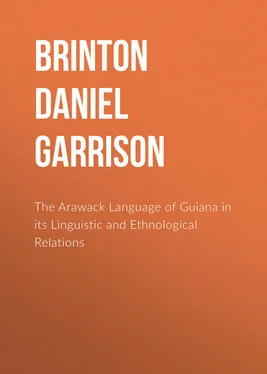Daniel Brinton - The Arawack Language of Guiana in its Linguistic and Ethnological Relations
Здесь есть возможность читать онлайн «Daniel Brinton - The Arawack Language of Guiana in its Linguistic and Ethnological Relations» — ознакомительный отрывок электронной книги совершенно бесплатно, а после прочтения отрывка купить полную версию. В некоторых случаях можно слушать аудио, скачать через торрент в формате fb2 и присутствует краткое содержание. ISBN: , Жанр: foreign_antique, foreign_prose, на английском языке. Описание произведения, (предисловие) а так же отзывы посетителей доступны на портале библиотеки ЛибКат.
- Название:The Arawack Language of Guiana in its Linguistic and Ethnological Relations
- Автор:
- Жанр:
- Год:неизвестен
- ISBN:http://www.gutenberg.org/ebooks/31273
- Рейтинг книги:5 / 5. Голосов: 1
-
Избранное:Добавить в избранное
- Отзывы:
-
Ваша оценка:
- 100
- 1
- 2
- 3
- 4
- 5
The Arawack Language of Guiana in its Linguistic and Ethnological Relations: краткое содержание, описание и аннотация
Предлагаем к чтению аннотацию, описание, краткое содержание или предисловие (зависит от того, что написал сам автор книги «The Arawack Language of Guiana in its Linguistic and Ethnological Relations»). Если вы не нашли необходимую информацию о книге — напишите в комментариях, мы постараемся отыскать её.
The Arawack Language of Guiana in its Linguistic and Ethnological Relations — читать онлайн ознакомительный отрывок
Ниже представлен текст книги, разбитый по страницам. Система сохранения места последней прочитанной страницы, позволяет с удобством читать онлайн бесплатно книгу «The Arawack Language of Guiana in its Linguistic and Ethnological Relations», без необходимости каждый раз заново искать на чём Вы остановились. Поставьте закладку, и сможете в любой момент перейти на страницу, на которой закончили чтение.
Интервал:
Закладка:
Numbers. The plural has no regular termination. Often the same form serves for both numbers, as is the case in many English words. Thus, itime fish and fishes, siba stone and stones, känsiti a lover and lovers. The most common plural endings are ati , uti , and anu , connected to the root by a euphonic letter; as uju mother, ujunuti mothers, itti father, ittinati fathers, kansissia a loved one, kansissiannu loved ones.
Of a dual there is no trace, nor does there seem to be of what is called the American plural (exclusive or inclusive of those present). But there is a peculiar plural form with a singular signification in the language, which is worthy of note. An example will illustrate it; itti is father, plural ittinati ; wattinati is our father, not our fathers, as the form would seem to signify. In other words, singular nouns used with plural pronouns, or construed with several other nouns, take a plural form. Petrus Johannes mutti ujúnatu , the mother of Peter and John.
Genders. A peculiarity, which the Arawack shares with the Iroquois 3 3 Etudes Philologiques sur quelquee Langues Sauvages de l’Amerique , p. 87 (Montreal, 1866).
and other aboriginal languages of the Western continent, is that it only has two genders, and these not the masculine and feminine, as in French, but the masculine and neuter. Man or nothing was the motto of these barbarians. Regarded as an index of their mental and social condition, this is an ominous fact. It hints how utterly destitute they are of those high, chivalric feelings, which with us centre around woman.
The termination of the masculine is i , of the neuter u , and, as I have already observed, a permutation of the semi-vowels l and r takes place, the letter becoming l in the masculine, r in the neuter. A slight difference in many words is noticeable when pronounced by women or by men. The former would say keretin , to marry; the latter kerejun . The gender also appears by more than one of these changes: ipillin , great, strong, masculine; ipirrun , feminine and neuter.
There is no article, either definite or indefinite, and no declension of nouns.
PRONOUNS
The demonstrative and possessive personal pronouns are alike in form, and, as in other American languages, are intimately incorporated with the words with which they are construed. A single letter is the root of each: d I, mine, b thou, thine, l he, his, t she, her, it, its, w we, our, h you, your, n they, their; to these radical letters the indefinite pronoun ükküahü , somebody, is added, and by abbreviation the following forms are obtained, which are those usually current:
dakia, dai, I.
bokkia, bui, thou.
likia, he.
turreha, she, it.
wakia, wai, we.
hukia, hui, you.
nakia, nai, they.
Except the third person, singular, they are of both genders. In speaking, the abbreviated form is used, except where for emphasis the longer is chosen.
In composition they usually retain their first vowel, but this is entirely a question of euphony. The methods of their employment with nouns will be seen in the following examples:
üssiquahü , a house.
dássiqua, my house.
bússiqua, thy house.
lüssiqua, his house.
tüssiqua, her, its house.
wássiqua, our house.
hüssiqua, your house.
nássiqua, their house.
uju , mother.
daiju, my mother.
buju, thy mother.
luju, his mother.
tuju, her mother.
waijunattu, our mother.
hujuattu, your mother.
naijattu, their mother.
waijunuti, our mothers.
hujunuti, your mothers.
naijunuti, their mothers.
Many of these forms suffer elision in speaking. Itti father, datti my father, wattínatti our father, contracted to wattínti ( watti rarely used).
When thus construed with pronouns, most nouns undergo some change of form, usually by adding an affix; báru an axe, dábarun my axe, iulí tobacco, dajulite my tobacco.
ADJECTIVES
The verb is the primitive part of speech in American tongues. To the aboriginal man every person and object presents itself as either doing or suffering something, every quality and attribute as something which is taking place or existing. His philosophy is that of the extreme idealists or the extreme materialists, who alike maintain that nothing is , beyond the cognizance of our senses. Therefore his adjectives are all verbal participles, indicating a state of existence. Thus üssatu good, is from üssân to be good, and means the condition of being good, a good woman or thing, üssati a good man.
Some adjectives, principally those from present participles, have the masculine and neuter terminations i and u in the singular, and in the plural i for both genders. Adjectives from the past participles end in the singular in issia or üssia , in the plural in annu . When the masculine ends in illi , the neuter takes urru , as wadikilli , wadikurru , long.
Comparison is expressed by adding bén or kén or adin (a verb meaning to be above) for the comparative, and apüdi for the diminutive. Ubura , from the verb uburau to be before in time, and adiki , from adikin to be after in time, are also used for the same purpose. The superlative has to be expressed by a circumlocution; as tumaqua aditu ipirrun turreha , what is great beyond all else; bokkia üssá dáuria , thou art better than I, where the last word is a compound of dai uwúria of, from, than. The comparative degree of the adjectives corresponds to the intensive and frequentative forms of the verbs; thus ipirrun to be strong, ipirru strong, ipirrubîn and ipirrubessabun to be stronger, ipirrubetu and ipirrubessabutu stronger, that which is stronger.
The numerals are wonderfully simple, and well illustrate how the primitive man began his arithmetic. They are: —
1 abba.
2 biama, plural biamannu.
3 kabbuhin, plural kubbuhinínnu.
4 bibiti, plural bibitinu.
5 abbatekkábe, plural abbatekabbunu.
6 abbatiman, plural abbatimannínu.
7 biamattiman, plural biamattimannínu.
8 kabbuhintiman, plural kabbuhintimannínu.
9 bibitiman, plural bibititumannínu.
10 biamantekábbe, plural biamantekábunu.
Now if we analyze these words, we discover that abbatekkábe five, is simply abba one, and akkabu , hand; that the word for six is literally “one [finger] of the other [hand],” for seven “two [fingers] of the other [hand],” and so on to ten, which is compounded of biama two, and akkabu hands. Would they count eleven, they say abba kutihibena one [toe] from the feet, and for twenty the expression is abba lukku one man, both hands and feet. Thus, in truth, they have only four numerals, and it is even a question whether these are primitive, for kabbuhin seems a strengthened form of abba , and bibuti to bear the same relation to biama . Therefore we may look back to a time when this nation knew not how to express any numbers beyond one and two.
Although these numbers do not take peculiar terminations when applied to different objects, as in the languages of Central America and Mexico, they have a great variety of forms to express the relationship in which they are used. The ordinals are:
Читать дальшеИнтервал:
Закладка:
Похожие книги на «The Arawack Language of Guiana in its Linguistic and Ethnological Relations»
Представляем Вашему вниманию похожие книги на «The Arawack Language of Guiana in its Linguistic and Ethnological Relations» списком для выбора. Мы отобрали схожую по названию и смыслу литературу в надежде предоставить читателям больше вариантов отыскать новые, интересные, ещё непрочитанные произведения.
Обсуждение, отзывы о книге «The Arawack Language of Guiana in its Linguistic and Ethnological Relations» и просто собственные мнения читателей. Оставьте ваши комментарии, напишите, что Вы думаете о произведении, его смысле или главных героях. Укажите что конкретно понравилось, а что нет, и почему Вы так считаете.












